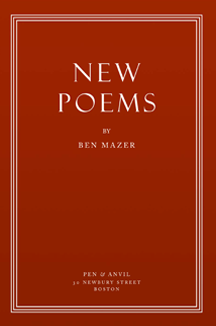

| Preview poems from the collection: |
|
|
 |
| New Poems //
by Ben Mazer // 978-0982162538 |
|
// September 2013
// paper binding
// poetry |

|

|
"A vigorous, enchanting book!"
- Rosanna Warren, winner of the Sara Teasdale Award in Poetry
Ben Mazer has ever been a poet impelled to take possession of the literary and mythic past, and to experience it as if it were somehow his own personal heritage. In New Poems, he embraces that calling, and writes in a voice that belongs to the continuous poetic present, an illimitable moment that is all at once mid-century, Elizabethan, metaphysical, and acutely modern.
New Poems consists of works written between April 2010 and April 2013, many of which have been featured in journals including The Brooklyn Rail, Clarion, Harvard Review, Jacket, Poetry Northeast, and Spirited. |
|
Philip Nikolayev , founding editor, Fulcrum: "Ben Mazer is lyric poetry's true hero and has not compromised one iota, as his amazing works attest with their singular purity, beauty and heartbreak."
John Ashbery: "Like fragments of old photographs happened on in a drawer, Ben Mazer's poems tap enigmatic bits of the past that suddenly come to life again. To read him is to follow him along a dreamlike corridor where everything is beautiful and nothing is as it seems."
David Ferry: "A rich experience to read this book, with so many fascinating, tantalizing poems in it." (writing about Tales of the Buckman Tavern)
Richard Wilbur: "Poetry. A number of elusive poems, often striking in their figures, repeat the cryptic motifs of fountain, ravine, boulevard, coins. In one poem at least I encounter the simple-visionary mode of Blake." (writing about White Cities)
Kevin Gallagher, editor, spoKe: "These love poems are Mazer's pinnacle so far. They have his poetics and the poetry combined at his highest level. These new poems will make any person, poet or otherwise, love him, cry with him, and be him."
Jeet Thayil: "Ben Mazer plows an unexpected furrow in the context of contemporary American poetry. His work is formal and playful, both steady and mad, and it is spiked with the dangerous pleasures of change." (writing about Tales of the Buckman Tavern)
Todd Swift, publisher, Eyewear Books: "Dazzingly clever."
Glyn Maxwell: "Ben Mazer is one of the few poets of his generation to understand that only mastery of craft will bring you to the natural breath, and that to sing memorably in verse, with the body, on the line, is the only way to sound the depths of the passing moment."
Bill Berkson, author of Portrait and Dream: "A surge of poems in the aftermath of a friend's sudden death, recalling Emily Dickinson's 'After great sadness a formal feeling comes.' And indeed the formality here is in the nature of a deliverance. Not so easy: the echoes rage and multiply, rhymes (better/ water/ patter) knock about and sometimes screech, big-time history pales or looks cheap compared to simpler intimacies — and sometimes a moon-like 'she' appears to cast much-needed receptivity every which way. The poems are all necessity, 'a frozen crystal spectrum magnified,' a procession."
Stephen Sturgeon, author of Trees of the Twentieth Century: "Whose poems are these? It looks like the heads of a hundred people made them, yet there is no disjunction, no coil of expression, no tragic dissolution here that fails our understanding. Don Juan, at the end of his life and trapped in a mineshaft, might have called these poems up to us. We need more of these poems, quickly, and we are in a state of distinguished penury now, for only one person, Ben Mazer, can supply them, and however much he provides there will always be grasping for more." (writing about Johanna Poems)
Katy Henriksen, publisher, Cannibal Books: "Ben Mazer's January 2008 reads like pages ripped from an ingenious madman's most personal journal, like love letters never sent — in other words like unbridled passion penned in the flame of a moment and not meant for any eyes but the writer's own. Here intense confessional lines seduce us into a universe of surreal grotesque, where satin monkeys keep company alongside Frankenstein and movie stars from the golden age of cinema appear nonchalantly alongside Dante's Beatrice in Mazer's testament to love, loss, and most importantly, to poetry."
Todd Swift, publisher, Eyewear Books: "Ben Mazer — Harvard-educated poet and scholar — remains one of the more fascinating and surprising of contemporary American poets, with a high-modernist and unapologetic rhetorical gift that fuses aspects of Early Eliot and the Fugitives with Lowell and even Crane. He is daring, eccentric, and passionate, creating lyric poems as moving and beautiful as any ever written in English."
Ifeanyi Menkiti: "What we have noticed in Mazer's collection is that there is in him a strong feeling that unless we bring our world to a state of wonder once more, nothing we do will ever matter."
|
| Critical acclaim for Ben Mazer's poetry: |
Ann Fallon: "Encountering [Ben Mazer's poetic voice] is like encountering King Lear’s wise fool as he shatters sense and nonsense and reassembles from the pieces, new insights into the heart and vulnerability of a human being."
Mario Murgia, The Critical Flame: "Mazer's verse is neither in ideas nor in things, but midway between the two. It broods upon the impressive implications of its own language and does not — or cannot — rid itself of the inexplicability of metaphor . . . In 'Second Rhapsody', Mazer conceives the preparation of a silent, unannounced future, 'wordlessly as memory.' This is how the best poetry, memorable poetry, must be prepared . . . Mazer, through his writing, makes sure every reading, ever convergence between the eyes of a reader and the line of a poem, is determinde by the joy — or the grief — of a momentous encounter. Congratulations, Mr. Mazer, you have been hired as one of the representatives of memorability in contemporary American poetry."
Thomas Graves, Scarriet: "Mr. Mazer is now one of the best poets in the country — perhaps the best — at the type of poem which pins you to the ground with its language and yet can comfort you with its mesmerizing, suggestive, hazy, uncanny, poignant, sweet, expansive anxiety. Mazer achievers that 'stupefying intelligence,' that pleasant drowning quality in his poetry — it disarmes the sternest intellectuals and burns novices to the core."
Seth Abramson, The Huffington Post: "The unit of measure in many of these poems is the sentence; the unit of knowledge — in all of them — is consistently, and astoundingly so, the universe. Mazer is a talented and enormously ambitious poet whose primary medium is nothing less than the sum total of all our collective and individual memories. Many, many more people should be reading Ben Mazer than presently are."
Henry Gould, The Critical Flame: "Mazer is an Eliot redivivus. More precisely, Mazer triangulates Eliot by way of Ashbery and Hart Crane, with the added factor of some fourth, deeply-encrypted dimension . . . [His] is a mode of dramatic indirection, shaped into moral allegory, both placed (localized) and displaced (universalized). It illuminates how poetry, like painting, can embody meaning, rather than rationalize it into dead buzzwords."
Thomas Graves, Scarriet: "Mazer is revolutionary, in our view, because, for the first time since Tennyson, poetry is once again allowed to be itself, to produce symphonies—with no need to parody, or feel self-consciously modern. Mazer’s poems seem to say to us: Among all your sufferings, look! this lighted window really is for you. The couch of art, with its faint, sad music, belongs to everyone. You may all rest here. Mazer is doing something wonderful and important. No one should resent this. Mazer is it."
Ann Fallon: "Ben Mazer's poetry addresses the role of the poet in a deeply existential way which also expresses the primal astonishment at the fact of the existence of the world."
Christopher Bock, Jacket: "Ben Mazer's poems find aesthetic unity by arranging their emotional resonances in the themes and variations of the musical phrase, giving both voice and silence to the personal experiences that evade language . . . Mazer's layering of details, coupled with a tautness of form that is carefully governed by an exceptional musical ear, places him among the most dynamic and original poets of his generation."
Patrick Morrissey, Harp & Altar: "A poet unabashedly entralled by the past, one who has the good sense to turn his own obsessions into his poems's strength. Memory simultaneously masters Mazer and is made to speak through him."
Ailbhe Darcy, The Critical Flame: "Mazer recognizes that the lyric is more like a movie than like other literary forms . . . By deliberately withholding information he seems, at first blush, to betray the contract between poet and reader. The illusion of lyric is of a soul being bared. In fact, Mazer is here being more honest than most about the trick of the lyric, and his illicit overtness (another kind of soul-baring) gives the poem its thrill."
Liza Katz, Open Letters Monthly: "Mazer does not tailor language to create a narrative experience; in fact, to say these poems have a “speaker” would not do them justice. One does not have the feeling of being spoken to but of having the rare opportunity to peer into another’s mind."
Christopher Cadra, The Literati Quarterly: "The Glass Piano exhibits not just technical skill, but also a fierce intelligence and artistry that seeps through each and every iamb and rhyme. . . . A vitality that makes the work read as fresh and contemporary as anything out there . . . What Mazer pulls off is great poems, one after another, that, yes, do indeed rhyme, without reminding one of the above quoted lines from Pope, and without seeming antiquated, that are injected with a fresh vitality that rushes through each line, each rhyme, and the whole of the work itself. A vitality that makes the work read as fresh and contemporary as anything out there . . . he's a voice worth reckoning to the titans of English verse."
Alexandra Kulik, Hyperallergic: "Ben Mazer may best be considered a poet for poets; his work a fortress against the common reader . . . it may be that he eludes explanation while magnifying instead the emotional-intuitive vibration of sound patterns, the intrinsic beauty of words somehow organically falling together in metrical grace . . . Mazer writes poetry not only because it comes to him as naturally as leaves to a tree, but because he cares about keeping alive this connection between poetic minds, which in turn keeps firm the string of influence . . . For those (rare) poetic minds out there, The Glass Piano is a book written for you and possibly about you. It is only a matter of time before one of us incidentally stumbles upon Mazer's work and says, in awe, 'This is me.'"
Paul S. Rowe, Moonchild Magazine : "December Poems and February Poems bring readers back to winter months bereft of love, and Mazer begs them, like his speaker to his beloved, to 'lie awhile in April and in May / beneath the trees, and harry [her] to stay / with tears of genuine love.'"
Thomas Graves, Scarriet: "He is the best pure poet writing in English today."
Marcel Inhoff, Journal of Poetics Research: "Ben Mazer has married a mastery of form to a riveting emotional voice in a way that strikes me as quite distinctive not just in contemporary poetry but in poetry generally."
Raymond C. Barfield, Journal of Poetics Research: "Mazer often quietly makes the incredible credible, which it must be, because poetry is conceived with reality."
Paul S. Rowe, Eyewear: "Mazer reminds us that our 'shards of history' are refracted with both light and shadow, love and grief."
Joe Green, Ragazine: "Mazer is a poet 'Who is Known' some places but who needs to be placed where he belongs and acknowledged as a great poet in the trembling noosphere of the poetry that is and was."
|
|
Born New York City 1964. Grew up in Lexington and Cambridge, Massachusetts. Studied with Seamus Heaney and William Alfred at Harvard University. Studied with Christopher Ricks, Geoffrey Hill, Archie Burnett at Boston University (MA, PhD). Collections include New Poems (Pen & Anvil), The Glass Piano (MadHat), Tales of the Buckman Tavern (Poetrywala), January 2008 (Dark Sky Books), and White Cities (Barbara Matteau Editions). Editor of Selected Poems of Frederick Goddard Tuckerman (Harvard University Press), Landis Everson's Everything Preserved: Poems 1955-2005 (Graywolf Press, winner of the Emily Dickinson Award from the Poetry Foundation), and The Collected Poems of John Crowe Ransom (Un-Gyve Press). Verse plays include A City of Angels (Cy Gist Press) and The Rain (O'clock Press). Chapbooks include Johanna Poems (Cy Gist Press), The Foundations of Poetry Mathematics (Cannibal Books) and The King. Contributing editor to Fulcrum: an Annual of Poetry and Aesthetics. (Edited anthologies of "The Berkeley Renaissance" and "Poetry and Harvard in the 1920s" for Fulcrum). Editor of The Battersea Review. Poems have appeared in publications including Verse, Jacket, Stand, Agenda, Pequod, The Common, Boston Review, Harvard Review, Warwick Review, Poetry Northeast, Fulcrum, Harvard Magazine, Dark Horse, Horizon, Salt, Poetry Wales, Eyewear, The Wolf, Zoland Poetry, The Rumpus, Cannibal, Poetry Daily, Typo, Clarion, Open Letters Monthly, etc. |
|
|


